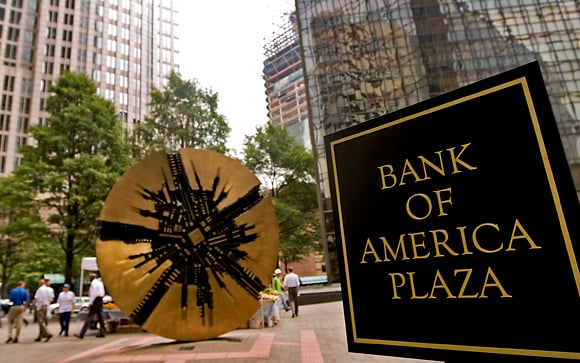Bank of America Corp. is running out of time to fulfill a promise to raise more capital by year-end and may be forced to make up the shortfall by paying some bonuses in stock rather than cash.
The gap of about $1.1 billion at Bank of America, the largest U.S. lender by assets, stems from its accord last December to repay $45 billion of federal bailout funds and escape the Troubled Asset Relief Program. As part of the deal, the bank agreed to sign contracts by June 30 for asset sales that would raise capital. The sum, originally $4 billion, was later reset at $3 billion and the deadline extended to Dec. 31.
With two months left, the Charlotte, North Carolina-based company said in a Nov. 5 quarterly report the bank “must raise a commensurate amount of common equity” if asset sales don’t bring in the necessary funds. Bank of America raised $1.9 billion so far to meet the commitment, and the gap may be closed by issuing stock to some of its approximately 284,000 employees, according to the filing.
“They are going to meet their commitment and if they have to, they’ll do it through their employees,” said Mark Borges, a compensation consultant at Compensia Inc. in Corte Madera, California. “Given the size of the compensation pool, they may be able to meet the entire requirement by selling stock to insiders rather than outsiders.”
Bank of America has set aside $26.3 billion for employee compensation through the first nine months of the year, compared with $21.6 billion at JPMorgan Chase & Co. and $18.6 billion at Citigroup Inc., both based in New York, according to company filings. Bank of America hasn’t determined 2010 bonuses and doesn’t break out what percentage they’re paid in stock versus cash, said Jerry Dubrowski, a company spokesman.
Any new shares issued to employees would immediately vest and could be traded right away, according to the filing. Bank of America’s stock closed at $12.36 last week, down 18 percent this year under the watch of Chief Executive Officer Brian T. Moynihan, 51, while the Standard & Poor’s 500 was climbing 9.9 percent to a two-year high.
This wouldn’t be the first time the bank substituted shares for cash. In December 2009, the company said it would issue $1.7 billion in shares to employees instead of year-end bonuses.
“We are actively selling our noncore assets and we are working hard to get those transactions done by the end of the year,” Dubrowski said.
Bank of America said Nov. 3 that it plans to sell as many as 40.8 million shares in
BlackRock Inc., the world’s largest money manager. The sale is likely to net an after-tax gain of more than $300 million, Guggenheim Securities LLC analyst Marty Mosby said in a Nov. 4 interview.
Paying bonuses in stock is unlikely to anger employees because price appreciation can boost the value of awards, said Frank Glassner, chief executive officer of Veritas Executive Compensation Consultants LLC in San Francisco.
“Shares are trading at a low,” Glassner said. If employees hold the stock, “there may be a bit of a wait but the leverage on the upside is significant.”
Bonuses at Bank of America have triggered disputes before with regulators and lawmakers. Congress held hearings that questioned whether the bank should have paid any kind of bonuses to employees of Merrill Lynch & Co., the brokerage acquired in 2009, even as the firm’s losses triggered a federal bailout for Bank of America.
The bank’s plan to pay as much as $5.8 billion to Merrill employees also riled shareholders and led to the departure in December of then-CEO Kenneth D. Lewis.
Last February, a federal judge approved a $150 million settlement with the U.S. Securities and Exchange Commission that alleged the bank misled investors about the bonus payments. The SEC called the accord the largest financial penalty ever assessed for violating proxy disclosure rules.
Year-end incentive payments are dependent on the performance of the company, business units and individuals, the bank said in a December 2009 filing. The company has said it is on course through the first nine months of the year to pay employees an average of $92,723, 10 percent more than 2009.
Receiving a larger percentage of compensation in shares means employees are more exposed if the bank’s fortunes decline, particularly with regard to the prospect of faulty foreclosures and mortgage buybacks, Compensia’s Borges said.
Attorneys general in 50 states are investigating foreclosures at the largest lenders. Mortgage-bond investors including
BlackRock and Pacific Investment Management Co. have said they’re seeking to force Bank of America to repurchase mortgages packaged into $47 billion of bonds. Pimco is manager of the world’s largest bond fund.
Bank of America expects costs related to foreclosures to increase through 2011 as it faces regulatory scrutiny, according to the filing. Investigations may lead to fines, penalties or “significant legal costs in responding to governmental investigations and possible litigation,” the bank said.
“This whole foreclosure issue will weigh heavily,” Borges said. “The market will be watching closely to see how many of the employees convert that stock into cash and investors may use that as an indicator of whether the company will be able to weather the storm.”







